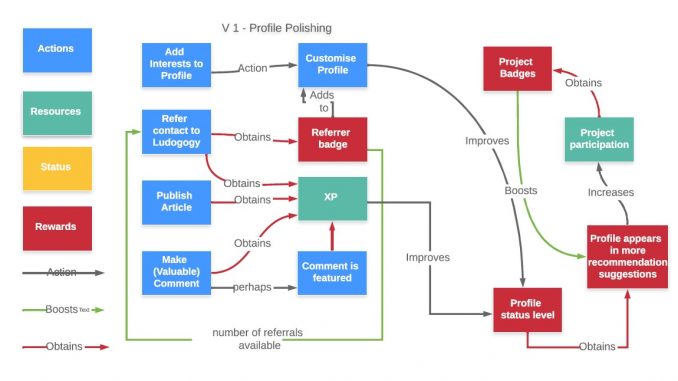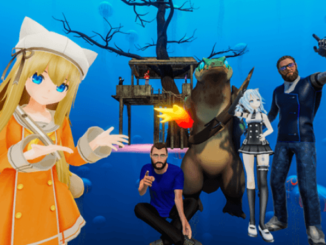
I bought a copy of ‘Actionable Gamification: Beyond Points, Badges and Leaderboards’ the very day it became available. I had been a fan of Yu-kai Chou’s Octalysis framework for some time by then, and I was using what I already knew of it regularly in my learning design work. I was keen to increase my knowledge and expand my practice, as it was a model that made a lot of sense to me, I found it relatively simple to apply, and I was seeing positive results.
Actionable Gamification is available on Amazon
I felt a similar excitement and anticipation a couple of months ago when I received an email about the Behavioural Design Masterclass. The main draw for me was the promise that it would contain material not covered elsewhere, neither in the book, nor in the videos provided on the Octalysis Prime Island, gamified learning platform.
Challenging and Comprehensive
The course definitely delivered on that promise. After a (very) brief introduction to the eight core drives, we were straight into new, and quite demanding territory. Although in theory, one could attend this Masterclass with no previous experience of the Octalysis framework, I would suggest that is not the best route to getting value from this course. You really need to be hitting the ground running.
The 12 lessons split quite neatly into three broad areas, firstly, the process of using the ‘Strategy Dashboard’ to inform the design of a gamification project, secondly, the ‘Battleplan’, a more detailed plan of specific features, and thirdly, prototyping techniques, particularly wireframing. There are actually five steps, but to me, looking back at the course, these were the three which took the time.
In my mind, it was this detailed description of process that I had always felt was missing from the book, where the dashboard was alluded to but never really fully explained. Having gone through this programme, I can now see why. To give an aspiring Octalysis practitioner the detail needed would have required at least another book of the same size, and even then, I don’t think it would have hit the mark in quite the same way as this programme did.
Better than Buying a Book
To learn how to use the Dashboard and Battleplan, one needs to use it for real, and to get feedback on what is produced. A book would never have achieved this, which is why the Masterclass was the best format for the job.

Discourse Platform
The course was implemented within Discourse and structured as 12 lessons over a 30 day period, with lessons being released every other day (ish) except weekends. Each lesson built on the previous one and there were practical assignments at ‘easy’, ‘medium’ or ‘difficult’ level to carry out and share with the rest of the cohort. Discourse was an ideal platform for this process, providing a forum in which learners could share, and support each other through asking and receiving helpful comments. Viewing and commenting on five other learners’ work was one of the ‘rules’ of participating, and fully throwing oneself into this process was by far the best way of extracting the most value out of participation.
The content itself was mostly in the form of videos, created and posted in the main by Yu-kai and Chris Tomasso, and these were supported by twice weekly live Q and A calls with Yu-kai and Iain Thakrah. The quality of questions from the floor and the responses from the team were high. As the course unfolded, the success of this approach could be seen in the high quality of the work produced by the participants.
Although the content was itself informative and valuable, by far the most value was derived from the interactions between the participants and between them and the delivery team, who were highly responsive (seemingly 24 hours a day). Not everyone was able to participate at a high level (more of this later), but for those who did, this was an eye-opening and valuable (and intense) learning experience, with much cross-pollination.
Value for Money
For some, the experience may have been somewhat overwhelming. The value for money, at a price point of $1000 (which could be spread over two payments), is undeniable. Maybe it is a sad indictment of other learning programmes that people were surprised at how much they got on this course, but the pace (if you wanted to participate at ‘difficult’ level, consume all the content and fulfil a commitment to interact meaningfully with other learners) was pretty relentless.
In fairness, while the live ‘delivery’ only lasted for 30 day, there was an additional 30 days in which one could complete the programme, still with access to the forum, and the content is available to learners forever. But for the few who completed all their ‘difficult’ assignments within the first 30 days or shortly thereafter, there will have been at least a few late nights.
The Next Logical Step in Octalysis Learning
If you are serious about offering Octalysis-based gamification design to clients, or if you have a project of your own which you want to gamify, this course will amply repay the effort and cost put into it. By the end you will have a good grounding in the five stage process and some good ideas for how to proceed. You can even segue into Level 1 Octalysis Certification (and If you wish, Level 2), but be aware, you will not be able to use the same project you used for this programme for either of those.
I have a feeling that these classes will not run very often; the time overhead for those delivering it, especially Yu-kai, Chris and Iain must be considerable, and the schedule of live Q and A sessions – run as they were at different times to accommodate participants from all over the world (but still attended by the delivery team, regardless), must be exhausting. Your chances to attend may be limited (CD6 – Scarcity and Impatience). But, if you have the opportunity, and you are prepared to put in the time over the 30-60 day duration, I would recommend this highly as the ‘next step’ to becoming an accomplished Octalysis practitioner, after either reading the book and/or accessing Octalysis Prime.
Actionable Gamification is available on Amazon
- James Bore – The Ransomeware Game - 13th February 2024
- Ipsodeckso – Risky Business - 23rd January 2024
- Review – Luma World Games - 15th December 2023





Thanks for the review Sarah! I’m glad you got so much out of the course. And yes, the pace was definitely not for everyone. I have no idea if or when we will run it again, actually.